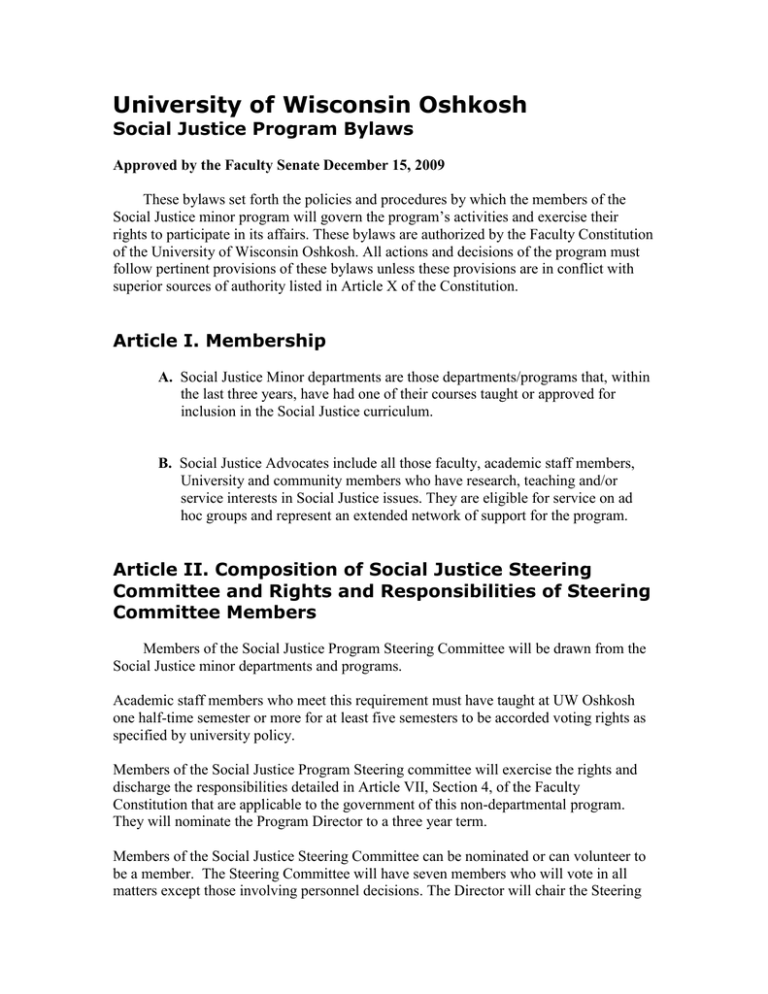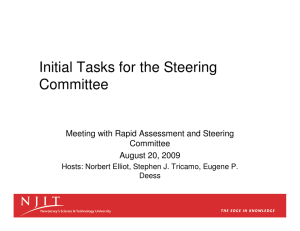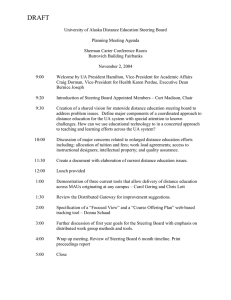University of Wisconsin Oshkosh Social Justice Program Bylaws
advertisement

University of Wisconsin Oshkosh Social Justice Program Bylaws Approved by the Faculty Senate December 15, 2009 These bylaws set forth the policies and procedures by which the members of the Social Justice minor program will govern the program’s activities and exercise their rights to participate in its affairs. These bylaws are authorized by the Faculty Constitution of the University of Wisconsin Oshkosh. All actions and decisions of the program must follow pertinent provisions of these bylaws unless these provisions are in conflict with superior sources of authority listed in Article X of the Constitution. Article I. Membership A. Social Justice Minor departments are those departments/programs that, within the last three years, have had one of their courses taught or approved for inclusion in the Social Justice curriculum. B. Social Justice Advocates include all those faculty, academic staff members, University and community members who have research, teaching and/or service interests in Social Justice issues. They are eligible for service on ad hoc groups and represent an extended network of support for the program. Article II. Composition of Social Justice Steering Committee and Rights and Responsibilities of Steering Committee Members Members of the Social Justice Program Steering Committee will be drawn from the Social Justice minor departments and programs. Academic staff members who meet this requirement must have taught at UW Oshkosh one half-time semester or more for at least five semesters to be accorded voting rights as specified by university policy. Members of the Social Justice Program Steering committee will exercise the rights and discharge the responsibilities detailed in Article VII, Section 4, of the Faculty Constitution that are applicable to the government of this non-departmental program. They will nominate the Program Director to a three year term. Members of the Social Justice Steering Committee can be nominated or can volunteer to be a member. The Steering Committee will have seven members who will vote in all matters except those involving personnel decisions. The Director will chair the Steering Committee and will be a voting member of it. Members on sabbatical may be replaced during their absence by volunteers from among the Social Justice participating departments/programs confirmed by the vote of a majority of the Steering Committee members. Members will serve three year terms and be eligible for immediate nomination for a subsequent term if so desired. Initial members will be voted in by the Director and a majority vote of the current ad-hoc social justice committee. These seven members will serve staggered terms: two for a 1-year term, two for 2-year terms and three for 3-year terms. Elections will occur at the end of the Spring semester, each year, and subsequent members will be confirmed by the vote of a majority of the current Steering Committee members. Article III. Social Justice Program Director A. Selection of the Director: The director of the SJ minor shall be an instructional academic staff or faculty member nominated by a majority vote of the Social Justice Steering Committee and appointed by the Dean of the College Letters and Science in accordance with the rules and procedures set down in Article VI, Section E of the College of Letters and Science Bylaws, in reference to non-departmental programs. The Director will serve a three year term, renewable upon evaluation and election by the Social Justice Steering Committee and reappointment by the Dean. B. Duties of the Director: The Director is the Social Justice program’s principal administrator and representative. (The general responsibilities of the Director are set forth in Article VIII, Section 5, of the Faculty Constitution). These include: responsibility for informing program faculty about all matters of importance, working with the Steering Committee to develop academic policies, making decisions about curriculum for the program and implementing these decisions. The director will participate in meetings of chairs and program directors convened by the College of Letters and Sciences and the University at large. C. Vacancies in office: If the office of Director becomes vacant, it shall be filled for the remainder of the unexpired term by a special nominating election of the Social Justice minor Program Steering Committee as outlined Article III, Section A, of this document. When the Director is unavailable for an extended period of time due to such circumstances as medical leave or sabbatical, an acting Director will be nominated by the Director, approved by a majority vote of the Social Justice Steering Committee and appointed by the Dean of the College of Letters and Sciences. Article IV. Committees The Social Justice program will have one standing committee, the Social Justice Steering Committee. An ad hoc Grievance Committee will be convened as needed. A. The Steering Committee will assist the Director in the program’s operation. It will formulate policies and procedures to govern the program’s curriculum and will review and act on course proposals submitted for inclusion in the Social Justice curriculum. In addition, it will review the existing curriculum and propose whatever curricular changes it deems necessary. B. The Grievance Committee will be convened as necessary to review complaints in accordance with the procedures of the program, the college, and the university. The three member Grievance Committee will be composed of tenured members of the Steering Committee or tenured faculty members who are currently teaching a course in the Social Justice Program who have indicated their willingness to serve and are then elected by the Steering Committee. The Director may not be a member of this committee. C. Ad Hoc Committees: The Steering Committee or the Director of the Social Justice program may establish ad hoc committees to achieve specific purposes beyond the purview of any standing committee. The membership and other details of committee structure, procedures and functions will be determined by vote of the Steering Committee when an ad hoc committee is established. Article V. Meetings A. Steering Committee Meetings: The Steering Committee will meet a minimum of twice a semester at a time determined to be most convenient for all members. The Director will send notice of all Steering Committee meetings and distribute a preliminary agenda to all Social Justice Program teaching faculty at least one week in advance and will identify all items of business requiring action. Social Justice Advocates not serving on the Steering Committee are welcome at the meetings but will not vote. Any Advocates of the Social Justice Program may propose agenda items for the Steering Committee. Items proposed by three or more members must be placed on the agenda. All meetings will be open. B. Special Meetings: Meetings of the Social Justice Program teaching personnel for special purposes may be called by the director. The agenda of a special meeting will be restricted to the special business which occasions the meeting. Notice of the meeting will be distributed at least one working day before the meeting is to be held if the business is urgent but generally a week’s notice is sufficient. The Steering Committee will decide whether to invite the SJ Advocates to attend the meeting. C. Quorum: A quorum at meetings of the SJ Steering Committee will consist of a majority of its members. Quorums will not be necessary for standing committees as these are advisory only. D. Voting: In order for any decision to pass, a majority vote of the members of the Social Justice Steering Committee is required. Article VI. Amendments Amendments to these bylaws may be proposed by any member of the SJ Steering Committee. Proposed amendments must be distributed at least one week prior to their consideration at the next regular meeting of the SJ Steering Committee. They may be voted on by ballots that are distributed not earlier than two weeks after the Steering Committee has approved a motion to put them to a vote. A majority vote of the members of the SJ Steering Committee is required.. Amendments adopted by majority vote will become effective when they have been accepted by the Faculty Senate. Article VII. Ratification of Bylaws The bylaws shall be ratified when they have been approved by a majority of the members of the SJ Steering Committee. These bylaws will become effective upon their ratification and their acceptance by the Faculty Senate.



